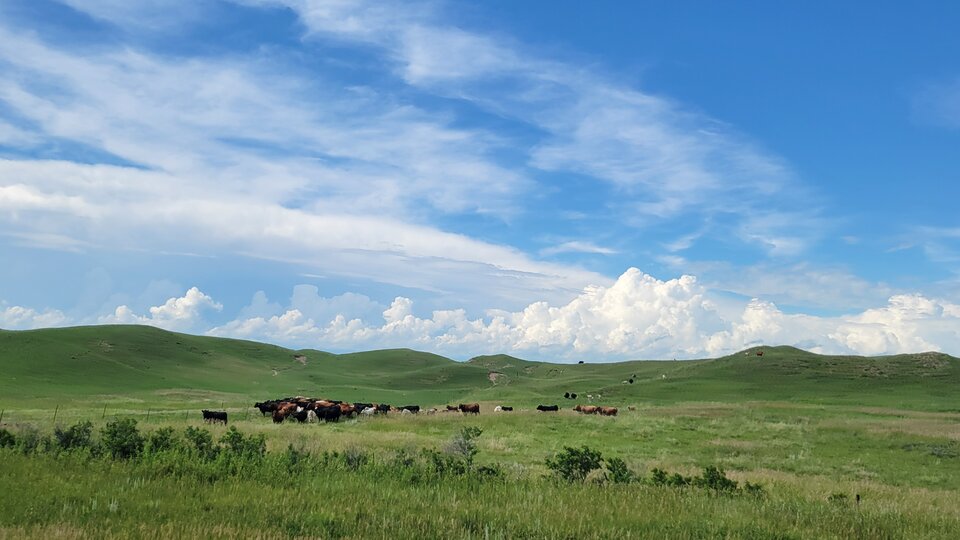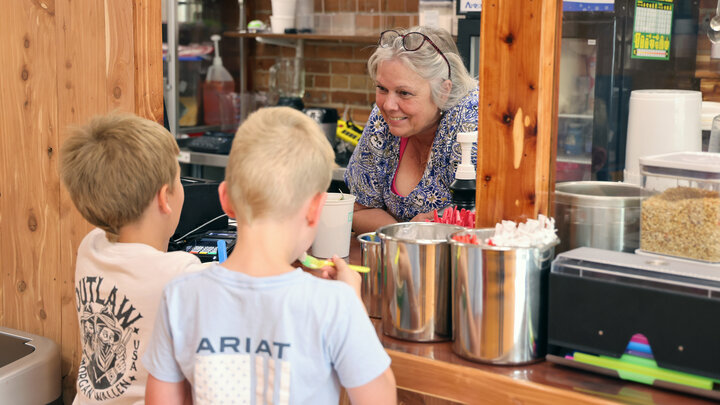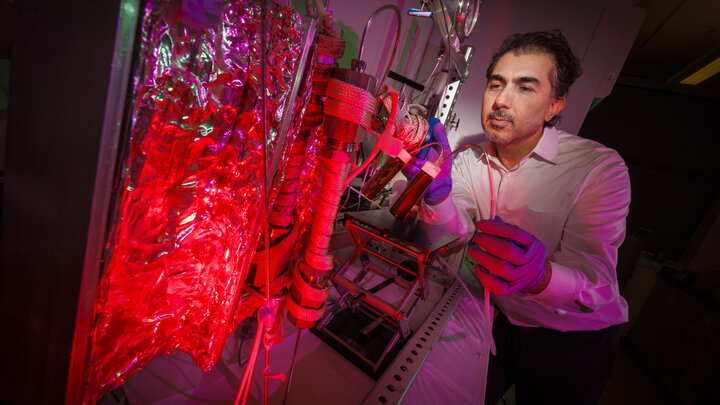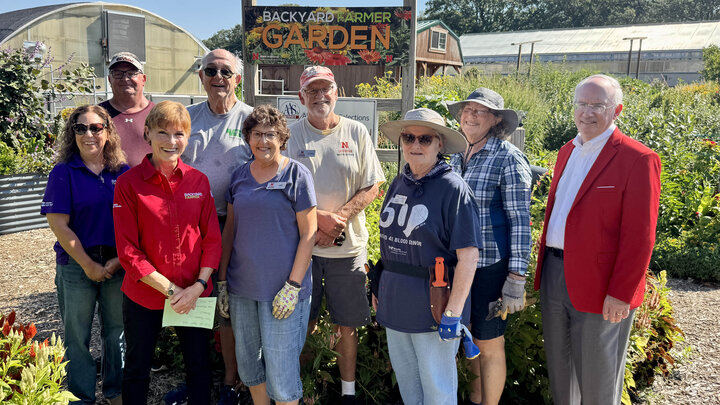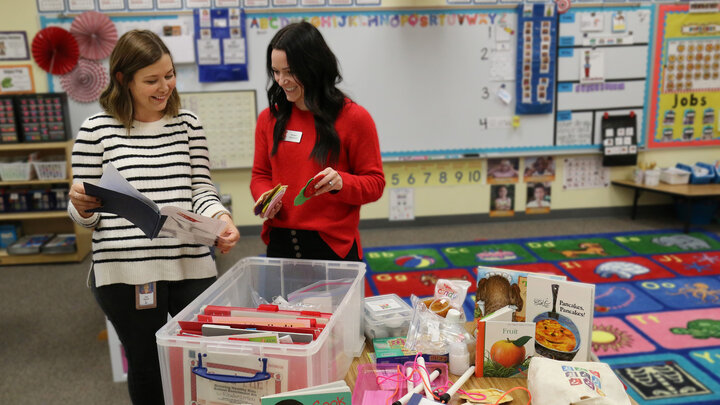Feature stories/news
Local Interest/Resources
The Central Sandhills Area Nebraska Extension Office serves Blaine, Grant, Hooker, and Thomas Counties. These four counties cover a 114-mile stretch of Highway 2 and 2,900 square miles (1,856,000 acres) in the heart of the Nebraska Sandhills. Beef cattle outnumber the people and are the main economic driver of the area. While the population of the Central Sandhills Area is less than 2,500 people, it includes four county governments, four county 4-H councils and fairs, four school districts, three state legislative districts, three health departments, two time zones, two educational service units, and one Nebraska Extension office.
Along with our local Livestock Systems Educator, 4-H/Youth Development Assistant, and Office Manager; regional Extension faculty work to serve the mission of Nebraska Extension in the Central Sandhills Area: engaging with Nebraskans wherever they are, connecting them with the resources, research and innovation of the University of Nebraska.
Local Items of Note
- 4-H Online Enrollment Website
- @beefeducator Resources/Links
- Central Sandhills Area 4-H Resources
Hay Testing Probes Available for Checkout
Accurately sampling and testing hay is the only way to get an accurate nutritive value to make sure cows are meeting requirements and to minimize hay waste. Central Sandhills Area Extension loans out hay probes for ranchers to collect hay samples. Call 645-2267 if you would like to borrow one.
- Our office and staff are funded by the four counties we serve and the University of Nebraska-Lincoln. Links to each county government webpage are below
News of Interest
Free Farm and Ranch Succession Workshop
Nebraska farm and ranch families are invited to attend a free educational workshop focused on succession and estate planning. Hosted by the Nebraska Rural Response Hotline in collaboration with Nebraska Department of Agriculture’s Beginning Farmer Tax Credit and Negotiations Programs, Nebraska Extension, and the Nebraska Farmers Union Foundation, these workshops are designed to help producers prepare for the future of their operations.
•
Estate and succession planning: key considerations, decisions, and available tools
•
Transfer, death and tax complications including portability,
•
The use of LLCs in succession planning: buy-sell agreements and asset protection.
•
Options, lease rights, and preemptive rights
•
Finance and management issues in succession strategies
Speakers: Agricultural Law attorney Weston Svoboda, and Jessica Groskopf, Extension Educator.
The Farm & Ranch Succession Workshop will take place:
Curtis, NE – Mar. 11th – 1:00 pm – 5:00 pm at Nebraska College of Technical Agriculture Welcome Center (610 E 6th Street).
While the workshops are free, we kindly ask that you register ahead of time to help us prepare lunch and materials, made possible by local sponsors. To register or for more information, please contact the Nebraska Rural Response Hotline at 1-800-464-0258.
This event is based upon work supported by the U.S. Department of Agriculture, under agreement number FSA22CPT0012189.
Farm & Ranch Succession Workshops
The February 4-H Newsletter is Here!
Check out the new February 4-H Newsletter Here!
Nebraska Extension in the Central Sandhills Area Welcomes Back 4-H Alum Brittney Walker
Nebraska Extension in the Central Sandhills Area Welcomes Back 4-H Alum Brittney Walker
“Making the Best Better” Comes Full Circle
The Central Sandhills Area Extension Office is thrilled to welcome back one of its own, Brittney Walker, as the new 4-H/Youth Assistant! A proud Hooker and Grant County 4-H alum, Brittney returns to her roots with a deep passion for youth development and rural communities, ready to inspire the next generation of 4-H leaders.
Raised on her family’s ranch just east of Whitman, Brittney's 4-H journey began at age nine. She quickly found her stride as a member of the Grant County Sharpshooters, competing at both state and national levels in BB gun and air rifle. She also showed market steers and made several sewing and baking exhibits for the Hooker County Fair. Among her favorite 4-H memories? Long summer days spent in the kitchen and sewing room with her grandma, learning the timeless skills that would help shape her future.
Brittney carried her passion for agriculture and leadership to the University of Nebraska-Lincoln, where she earned a degree in Grazing Livestock Systems with a minor in Agricultural Leadership, Education, and Communications in December 2022. She hit the ground running, serving as the 4-H Assistant in Seward County from January 2023 to August 2025.
Now, she’s coming home not just to familiar faces, but to a region she loves and knows by heart.
In her new role, Brittney will lead school enrichment programs and organize youth workshops across Blaine, Thomas, Hooker, and Grant counties. She’ll also work closely with local 4-H Councils and Clubs to support the hands-on learning experiences that define the 4-H tradition.
Her journey is a testament to the power of 4-H and now she’s ready to give back to the same community that helped shape her into the leader she is today.
Welcome home, Brittney!
For more information on 4-H in your area or how to get enrolled, Brittney can be reached at bemerson4@unl.edu or (308) 645-2267.

Rural Poll Reports
CONFIDENCE IN INSTITUTIONS
This report details 943 responses to the 2025 Nebraska Rural Poll, the 30th annual effort to understand rural Nebraskans’ perceptions. Respondents were asked a series of questions about their confidence in institutions. Trends for some of the questions are examined by comparing data from the 2017 Poll and 2021 Poll to this year’s results. In addition, comparisons are made among different respondent subgroups, that is, comparisons by age, occupation, region, etc.
TRADE POLICY
This report details 943 responses to the 2025 Nebraska Rural Poll, the 30th annual effort to understand rural Nebraskans’ perceptions. Respondents were asked a series of questions about trade policy. Trends for this question are examined by comparing data from the 2024 Poll to this year’s results. In addition, comparisons are made among different respondent subgroups, that is, comparisons by age, occupation, region, etc.
WELL-BEING
This report details 943 responses to the 2025 Nebraska Rural Poll, the 30th annual effort to understand rural Nebraskans’ perceptions. Respondents were asked a series of questions about their well-being. Trends for some of the questions are examined by comparing data from the 29 previous polls to this year’s results. Comparisons are made among different respondent subgroups, that is, comparisons by age, occupation, region, etc.
October 2, 2025: Extension Associate Professor Brad Lubben discusses economic concerns among rural Nebraskans from the 2025 Rural Poll on KMTV 3 News Now Omaha.
April 27, 2025: Extension Associate Professor Brad Lubben discusses the focus on rural perspectives in the 2025 Rural Poll on Pure Nebraska.
April 11, 2025: Assistant Professor Heather Akin discusses the Rural Poll's 30th anniversary on a Market Journal broadcast.
Center for Ag Profitability (CAP) Free Webinars
The Center for Ag Profitability's webinar series focuses on topics related to farm and ranch management, profitability, economics and farm survival for producers and ag industry professionals in Nebraska and beyond. The live webcasts are typically presented at noon Central time on Thursdays. Registration is always free. View upcoming webinars and watch past recordings at CAP Webinars
